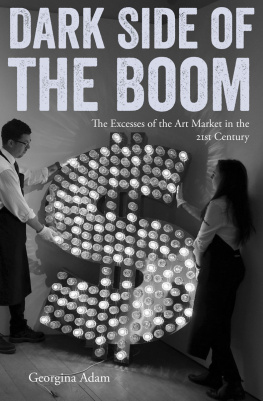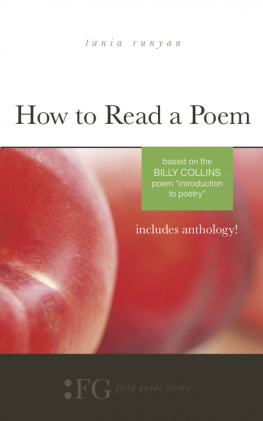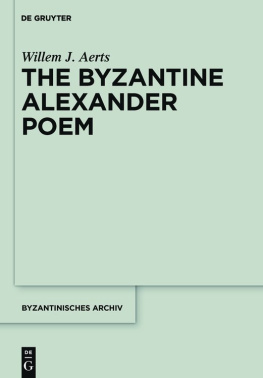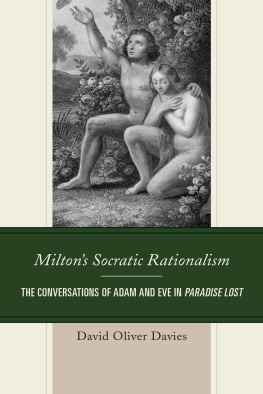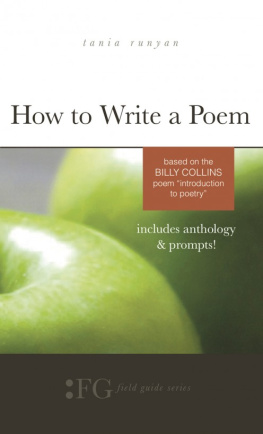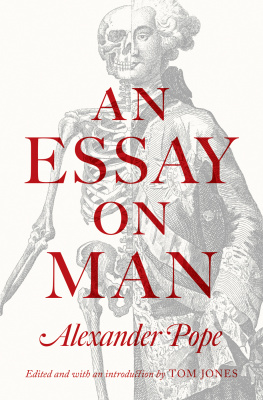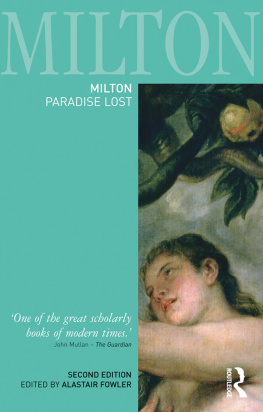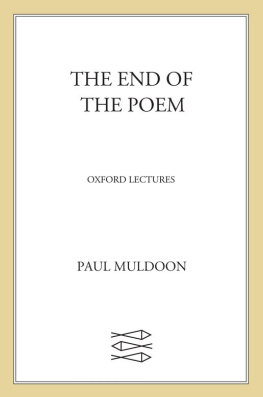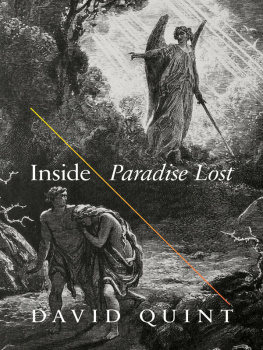Adam - Paradise Lost
Here you can read online Adam - Paradise Lost full text of the book (entire story) in english for free. Download pdf and epub, get meaning, cover and reviews about this ebook. City: UK;New York;Oxford, year: 2008;2005, publisher: Oxford University Press, genre: Romance novel. Description of the work, (preface) as well as reviews are available. Best literature library LitArk.com created for fans of good reading and offers a wide selection of genres:
Romance novel
Science fiction
Adventure
Detective
Science
History
Home and family
Prose
Art
Politics
Computer
Non-fiction
Religion
Business
Children
Humor
Choose a favorite category and find really read worthwhile books. Enjoy immersion in the world of imagination, feel the emotions of the characters or learn something new for yourself, make an fascinating discovery.

- Book:Paradise Lost
- Author:
- Publisher:Oxford University Press
- Genre:
- Year:2008;2005
- City:UK;New York;Oxford
- Rating:3 / 5
- Favourites:Add to favourites
- Your mark:
- 60
- 1
- 2
- 3
- 4
- 5
Paradise Lost: summary, description and annotation
We offer to read an annotation, description, summary or preface (depends on what the author of the book "Paradise Lost" wrote himself). If you haven't found the necessary information about the book — write in the comments, we will try to find it.
Adam: author's other books
Who wrote Paradise Lost? Find out the surname, the name of the author of the book and a list of all author's works by series.
Paradise Lost — read online for free the complete book (whole text) full work
Below is the text of the book, divided by pages. System saving the place of the last page read, allows you to conveniently read the book "Paradise Lost" online for free, without having to search again every time where you left off. Put a bookmark, and you can go to the page where you finished reading at any time.
Font size:
Interval:
Bookmark:
PARADISE LOST
JOHN MILTON
Introduced by
PHILIP PULLMAN


Great Clarendon Street, Oxford OX2 6DP
Oxford University Press is a department of the University of Oxford.
It furthers the Universitys objective of excellence in research, scholarship,
and education by publishing worldwide in
Oxford New York
Auckland Cape Town Dar es Salaam Hong Kong Karachi Kuala Lumpur
Madrid Melbourne Mexico City Nairobi New Delhi Shanghai Taipei Toronto
With offices in
Argentina Austria Brazil Chile Czech Republic France Greece
Guatemala Hungary Italy Japan Poland Portugal
Singapore South Korea Switzerland Thailand Turkey Ukraine Vietnam
Oxford is a registered trade mark of Oxford University Press
in the UK and in certain other countries
Published in the United States
by Oxford University Press Inc., New York
Paradise Lost taken from the Oxford Worlds Classics edition edited by Stephen Orgel and
Jonathan Goldberg
Introductions Philip Pullman 2005
The moral rights of the author have been asserted
Database right Oxford University Press (maker)
First published 2005
All rights reserved. No part of this publication may be reproduced,
stored in a retrieval system, or transmitted, in any form or by any means,
without the prior permission in writing of Oxford University Press,
or as expressly permitted by law, or under terms agreed with the appropriate
reprographics rights organizations. Enquiries concerning reproduction
outside the scope of the above should be sent to the Rights Department,
Oxford University Press, at the address above
You must not circulate this book in any other binding or cover
and you must impose this same condition on any acquirer
British Library Cataloguing in Publication Data
Data available
Library of Congress Cataloging in Publication Data
Data available
ISBN 019280619X
EAN 9780192806192
1 3 5 7 9 10 8 6 4 2
Designed by Bob Elliott
Typeset in Monotype Centaur MT and Adobe Garamond by
RefineCatch Limited, Bungay, Suffolk
Printed in Italy by
Grafiche Industriali
BY
PHILIP PULLMAN
ACORRESPONDENT once told me a storywhich Ive never been able to trace, and I dont know whether its trueabout a bibulous, semi-literate, ageing country squire two hundred years ago or more, sitting by his fireside listening to Paradise Lost being read aloud. Hes never read it himself; he doesnt know the story at all; but as he sits there, perhaps with a pint of port at his side and with a gouty foot propped up on a stool, he finds himself transfixed.
Suddenly he bangs the arm of his chair, and exclaims By God! I know not what the outcome may be, but this Lucifer is a damned fine fellow, and I hope he may win!
Which are my sentiments exactly.
Im conscious, as I write this introduction to the poem, that I have hardly any more pretensions to scholarship than that old gentleman. Many of my comparisons will be drawn from popular literature and film rather than from anything more refined. Learned critics have analysed Paradise Lost and found in it things I could never see, and related it to other works I have never read, and demonstrated the truth of this or that assertion about Milton and his poem that it would never have occurred to me to make, or, having made, to think that I could prove it.
But this is how I read this great work, and all I can do is describe that way of reading.
So I begin with sound. I read Paradise Lost not only with my eyes, but with my mouth. I was lucky enough to study Books I and II for A Level many years ago, and to do so in a small class whose teacher, Miss Enid Jones, had the clear-eyed and old-fashioned idea that we would get a good sense of the poem if, before we did anything else to it, we read it aloud. So we took it in turns, in that little Sixth Form classroom in Ysgol Ardudwy, on the flat land below the great rock of Harlech Castle, to stumble and mutter and gabble our way through it all, while Miss Jones sat with arms comfortably folded on her desk, patiently helping us with pronunciation, but not encumbering us with meaning.
And thus it was that I first read lines like this. Satan is making his way across the wastes of hell towards the new world he intends to corrupt, and a complex and majestic image evokes his distant flight:
As when far off at sea a fleet descried
Hangs in the clouds, by equinoctial winds
Close sailing from Bengala, or the isles
Of Ternate and Tidore, whence merchants bring
Their spicy drugs: they on the trading flood
Through the wide Ethiopian to the Cape
Ply stemming nightly toward the pole. So seemed
Far off the flying fiend
(Book II, lines 63643)
That passage stayed with me for years, and still has the power to thrill me. Ply stemming nightly toward the polein those words I could hear the creak of wood and rope, the never-ceasing dash of water against the bows, the moan of the wind in the rigging; I could see the dim phosphorescence in the creaming wake, the dark waves against the restless horizon, the constant stars in the velvet sky; and I saw the vigilant helmsman, the only man awake, guiding his sleeping shipmates and their precious freight across the wilderness of the night.
To see these things and hear them most vividly, I found that I had to take the lines in my mouth and utter them aloud. A whisper will do; you dont have to bellow it, and annoy the neighbours; but air has to pass across your tongue and through your lips. Your body has to be involved.
through many a dark and dreary vale
They passed, and many a region dolorous,
Oer many a frozen, many a fiery alp,
Rocks, caves, lakes, fens, bogs, dens, and shades of death,
A universe of death, which God by curse
Created evil, for evil only good,
Where all life dies, death lives, and nature breeds,
Perverse, all monstrous, all prodigious things,
Abominable, inutterable, and worse
Than fables yet have feigned, or fear conceived,
Gorgons and hydras, and chimeras dire.
(Book II, lines 61828)
The experience of reading poetry aloud when you dont fully understand it is a curious and complicated one. Its like suddenly discovering that you can play the organ. Rolling swells and peals of sound, powerful rhythms and rich harmonies are at your command; and as you utter them you begin to realize that the sound youre releasing from the words as you speak is part of the reason theyre there. The sound is part of the meaning, and that part only comes alive when you speak it. So at this stage it doesnt matter that you dont fully understand everything: youre already far closer to the poem than someone who sits there in silence looking up meanings and references and making assiduous notes.
By the way, someone who does that while listening to music through earphones will never understand it at all.
We need to remind ourselves of this, especially if we have anything to do with education. I have come across teachers and student teachers whose job was to teach poetry, but who thought that poetry was only a fancy way of dressing up simple statements to make them look complicated, and that their task was to help their pupils translate the stuff into ordinary English. When theyd translated it, when theyd understood it, the job was done. It had the effect of turning the classroom into a torture-chamber, in which everything that made the poem a living thing had been killed and butchered. No one had told such people that poetry is in fact enchantment; that it has the form it does because that very form casts a spell; and that when they thought they were bothered and bewildered, they were in fact being bewitched, and if they let themselves accept the enchantment and enjoy it, they would eventually understand much more about the poem.
Next pageFont size:
Interval:
Bookmark:
Similar books «Paradise Lost»
Look at similar books to Paradise Lost. We have selected literature similar in name and meaning in the hope of providing readers with more options to find new, interesting, not yet read works.
Discussion, reviews of the book Paradise Lost and just readers' own opinions. Leave your comments, write what you think about the work, its meaning or the main characters. Specify what exactly you liked and what you didn't like, and why you think so.

